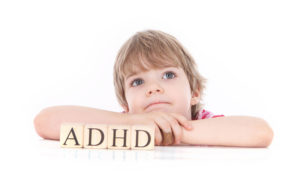Let’s face it. Little kids are balls of energy, capable of running circles around most adults. On a good day, they could exhaust even the most seasoned parent. Childhood is the time for exploration, pushing boundaries, and discovering limits. Toddlers, preschoolers and even younger school-age children are busy learning how to be functioning members of society. There will be missteps and moments when they just can’t “play by the rules”, but knowing when this behavior is developmentally appropriate, and being able to identify when there might be something more going on, will allow parents, teachers and caregivers the insight to ensure that all children are given what they need to succeed. Attention deficit hyperactivity disorder (ADHD) affects 8-10% of children, and is a disorder that results in hyperactivity, difficulties in concentration or paying attention, and problems with impulse control. While adults can also have the disorder, it always originates in childhood, often diagnosed in the preschool or early school-aged years. If untreated, it can affect the child’s concentration, school performance, behavior, emotional wellbeing, and social skills. So, it is important to know what the signs of ADHD are that should not be ignored.
What is ADHD?
ADHD is a diagnosis that consists of a persistent pattern of hyperactivity, impulsiveness, and inattention that interferes with a person’s ability to function in society, whether it be at school, home, work, or with friends. While adults may also be affected, the symptoms typically begin in early childhood. Generally, this might be seen in a child’s inability to remain seated, difficulty waiting their turn, trouble concentrating, or frequent daydreaming. There are different subtypes of the disorder, with some being more hyperactive and others struggling with maintaining focus and paying attention. The disorder occurs more commonly in boys, and is diagnosed about half the time by the age of 4. Additionally, estimates indicate that up to 70% of children affected by ADHD carry some form of the symptoms into adulthood with them.
There is no clear evidence identifying a single cause of ADHD. It can even appear to be inherited some of the time. Other risk factors that have been suggested as contributing to the disorder are smoking, drinking, or exposure to toxins during pregnancy, prematurity, prolonged labor and lack of oxygen during birth. Things during childhood that may also contribute to the development of ADHD are head injuries, infections, cerebral palsy and exposure to lead. Frequently, those with ADHD may also have tics (spastic contractions of muscles, often of the face), learning disabilities, genetic disorders, and/or psychiatric disorders. While we know that an imbalance in chemicals in the brain, as well as a decrease in activity in some areas of the brain, are contributors to the problems associated with ADHD, there are no known definitive causes that have been identified.
What are the Signs that Shouldn’t Be Ignored?
The signs of ADHD fall under two categories: hyperactivity and inattentiveness. While the signs of hyperactivity usually develop by 4 years of age and peak at about 8, the signs of inattentiveness are often not noticeable until the child is a little further advanced in school, at 8 to 9 years of age. It is important to understand when to look for these signs because these same behaviors may be appropriate, depending on the developmental age of the child. For instance, it is perfectly normal for a toddler to be very active; and likewise, a 5-year old child should not be expected to have the attention span of a 10-year old.
The following are a list of signs that you should report to your family medicine provider, for the child who is 4 or older.
- Being fidgety or having difficulty sitting still
- Leaving the classroom or not sitting in his/her seat as directed
- Running and climbing excessively
- Having trouble participating in quiet activities or games
- Activity resembling someone “driven by a motor”, or constantly moving
- Excessive Talking
- Blurting out answers or interrupting
- Trouble with waiting for turns
This next list contains signs you should report to your family medicine provider, in a child who is 8 years old or older.
- Difficulty paying attention and staying focused
- Frequent careless mistakes
- Not appearing to listen when spoken to
- Difficulty following instructions
- Disorganization
- Forgetting or losing necessary supplies; or forgetful in general
- Disliking activities that require mental concentration
- Easily distracted
- Poor follow-through abilities
The preceding list includes many of the signs your family medicine provider will be looking for when evaluating your child for ADHD. However, the presence of one or more sign, especially if the pattern is not consistent, does not mean your child has ADHD. It does mean that it is in your child’s best interest to discuss your concerns with your child’s family medicine provider, so that if necessary, appropriate treatment can be recommended.
We are concerned about the health and well-being of you and your family. If you have questions about any signs or symptoms your child may have, or if you would like more information about ADHD or any other health concerns, call Advanced Medical PA at (561) 434-1935 to request an appointment, or request one online.


